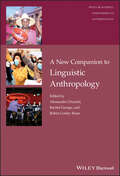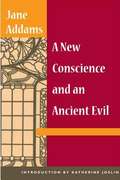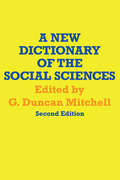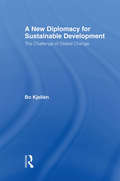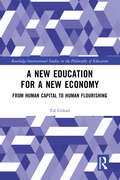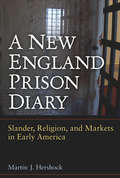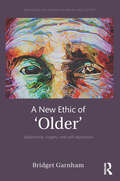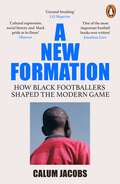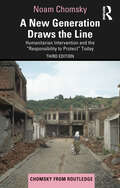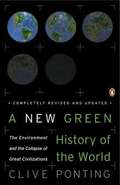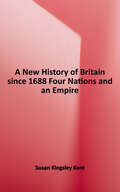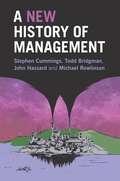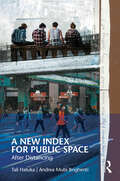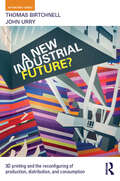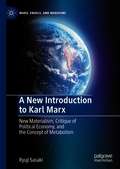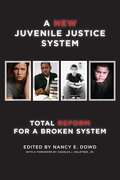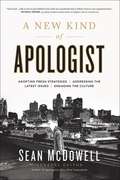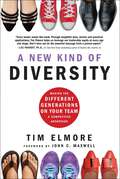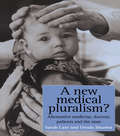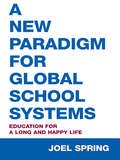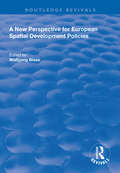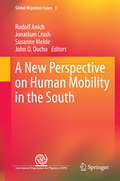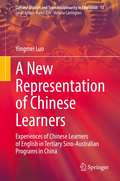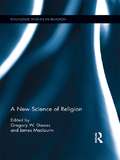- Table View
- List View
A New Companion to Linguistic Anthropology (Wiley Blackwell Companions to Anthropology)
by Alessandro Duranti Robin Conley Riner Rachel GeorgeProvides an expansive view of the full field of linguistic anthropology, featuring an all-new team of contributing authors representing diverse new perspectives A New Companion to Linguistic Anthropology provides a timely and authoritative overview of the field of study that explores how language influences society and culture. Bringing together more than 30 original essays by an interdisciplinary panel of renowned scholars and younger researchers, this comprehensive volume covers a uniquely wide range of both classic and contemporary topics as well as cutting-edge research methods and emerging areas of investigation. Building upon the success of its predecessor, the acclaimed Blackwell Companion to Linguistic Anthropology, this new edition reflects current trends and developments in research and theory. Entirely new chapters discuss topics such as the relationship between language and experiential phenomena, the use of research data to address social justice, racist language and raciolinguistics, postcolonial discourse, and the challenges and opportunities presented by social media, migration, and global neoliberalism. Innovative new research analyzes racialized language in World of Warcraft, the ethics of public health discourse in South Africa, the construction of religious doubt among Orthodox Jewish bloggers, hybrid forms of sociality in videoconferencing, and more. Presents fresh discussions of topics such as American Indian speech communities, creolization, language mixing, language socialization, deaf communities, endangered languages, and language of the law Addresses recent trends in linguistic anthropological research, including visual documentation, ancient scribes, secrecy, language and racialization, global hip hop, justice and health, and language and experience Utilizes ethnographic illustration to explore topics in the field of linguistic anthropology Includes a new introduction written by the editors and an up-to-date bibliography with over 2,000 entries A New Companion to Linguistic Anthropology is a must-have for researchers, scholars, and undergraduate and graduate students in linguistic anthropology, as well as an excellent text for those in related fields such as sociolinguistics, discourse studies, semiotics, sociology of language, communication studies, and language education.
A New Conscience and an Ancient Evil
by Jane AddamsPublished in 1912 on the heels of Twenty Years at Hull-House and at the height of Jane Addams's popularity, A New Conscience and an Ancient Evil assesses the vulnerability of the rural and immigrant working-class girls who moved to Chicago and fell prey to the sexual bartering of what was known as the white slave trade. Addams offers lurid accounts--drawn from the records of Chicago's Juvenile Protection Association--of young women coerced into lives of prostitution by men who lurked outside hotels and sweatshops. Because they lacked funds for proper recreation, Addams argues, poor and socially marginalized women were susceptible to sexual slavery, and without radical social change they would perhaps be "almost as free" as young men. In addition to promoting higher wages and better living conditions, Addams suggests that a longer period of public education for young women would deter them from the dangers of city life. Despite its appeal to middle-class readers eager for tales of sexual excess and the rape of innocence, the press and prominent intellectuals criticized A New Conscience and an Ancient Evil for being disproportionately hysterical to its philosophical weight. Katherine Joslin's introduction considers the controversial reactions to the book and the circumstances of its publication. Behind the sensationalism of the narratives, Joslin locates themes including the commodification of sex and the importance of marriage for young women.
A New Dictionary of the Social Sciences
by G. Duncan MitchellDesigned especially to meet the needs of beginners in all the social sciences, "A New Dictionary of the Social Sciences" follows its highly successful distinguished predecessor initially issued as "A Dictionary of Sociology" first published in 1968. Many of the entries have been revised and updated to keep abreast of the proliferation in the vocabulary of the social sciences. The volume remains on excellent single source for definitions in social research. The entries include social psychological terms, terms in social and cultural anthropology, terms common to political science, social administration and social work. In the choice of words, a generous definition of social science was employed, making the dictionary a very useful reference source for all beginners in the social sciences. Some terms are explained quite briefly while others are given lengthy treatment, according to the further assumptions that some sociological terms can imply. Thus, long entries are given on words, such as authority, consensus, phenomenology, role, social stratification, structuralism, whereas short and succinct entries suffice for words such, as agnate, eidos, or mores. A number of short biographical sketches are also included. The contributors are all scholars working in universities, predominantly in the United Kingdom and the United States. More than a glossary, "A New Dictionary of the Social Sciences" helps the student understand some of the theoretical considerations underlying the use of sociological terms, as well as something of their history, and therefore resembles an encyclopaedia in its scope and depth of information.
A New Diplomacy for Sustainable Development: The Challenge of Global Change (Routledge/SEI Global Environment and Development Series)
by Bo KjellénAccelerating, human-induced changes in global natural systems, with global warming as a prime example, are modifying international relations. Diplomacy has to recognize that new types of threats will require new solutions and a new spirit of cooperation. This is a gradual process; traditional conflicts will continue to haunt the international system and traditional methods of diplomatic work still prevail. Based on forty years of experience in multilateral negotiations as former diplomat and international negotiator, the author has developed the concept of a New Diplomacy for Sustainable Development. The book develops the theoretical foundations of the concept and links it to the notion of enabling conditions, describing the close linkages between domestic policies and international negotiations. In conclusion, Kjellén comments on present negotiation processes and offers ideas for institutional reform of the international system.
A New Education for a New Economy: From Human Capital to Human Flourishing (Routledge International Studies in the Philosophy of Education)
by Tal GileadProviding an in-depth, novel analysis of education’s role in today’s economy by scrutinizing its theoretical underpinnings, this volume critiques the suitability of the current, dominant economic framework for education and for shaping educational policymaking worldwide.Critically examining the history and philosophy that underpin our present societal understanding of the link between economics and education, the book argues for an urgent redefining of education’s role in the economy based on intellectual foundations that significantly differ from our current, dominant conceptions. Across seven chapters, the book posits that the adoption of a new philosophical framework, the reshaping of economic and educational aims, and the adjustment of our educational system are each necessary to better promote human flourishing.Ultimately providing a platform to entirely reconsider the idea that the primary aim of education is to serve the economic system – in particular, economic growth – this book will appeal to scholars, researchers, and postgraduate students studying educational policy, the philosophy of education, and the history of education more broadly. Education policymakers and academics studying education and the economy may also find this book of interest.
A New England Prison Diary: Slander, Religion, and Markets in Early America
by Martin J. HershockIn 1812, New Hampshire shopkeeper Timothy M. Joy abandoned his young family, fleeing the creditors who threatened to imprison him. Within days, he found himself in a Massachusetts jailhouse, charged with defamation of a prominent politician. During the months of his incarceration, Joy kept a remarkable journal that recounts his personal, anguished path toward spiritual redemption. Martin J. Hershock situates Joy's account in the context of the pugnacious politics of the early republic, giving context to a common citizen's perspective on partisanship and the fate of an unfortunate shopkeeper swept along in the transition to market capitalism. In addition to this close-up view of an ordinary person's experience of a transformative period, Hershock reflects on his own work as a historian. In the final chapter, he discusses the value of diaries as historical sources, the choices he made in telling Joy's story, alternative interpretations of the diary, and other contexts in which he might have placed Joy's experiences. The appendix reproduces Joy's original journal so that readers can develop their own skills using a primary source.
A New Ethic of 'Older': Subjectivity, surgery, and self-stylization (Routledge Key Themes in Health and Society)
by Bridget GarnhamThrough its themes of subjectivity, surgery, and self-stylization this book critically examines the cultural constraints and incitements that shape the practice of cosmetic surgery by older people. The book problematizes anti-ageing discourses to provide a nuanced descriptive, ethical, and political reading of ‘older’ identity politics nested within the contemporary ethico-political terrain of self-care. A New Ethic of ‘Older’ aims to de-territorialize the ‘older’ subject from normative discourses of ageing and theorize becoming ‘older’. Evidence of an active cultural politics of ‘older’ emerges from the critically reflexive engagement of older people with cosmetic surgery. This engagement constitutes a ‘cutting critique’ of ageing discourses enmeshed in an aesthetic mode of subjectivation that underpins ‘a new ethics of old age’. The book will appeal to those in the fields of Cultural Gerontology, Ageing Studies, Critical Psychology, Sociology, and Cultural Geography. The methodological approach will be of interest to academics and students exploring the application of Foucault’s work on care of the self to contemporary contexts and practices.
A New Formation: How Black Footballers Shaped the Modern Game
by Calum JacobsA New Formation is an inventive and highly original analysis of the contributions that Black British footballers have made to Black British culture.Calum Jacobs and his co-contributors - including authors Musa Okwonga and Aniefiok Ekpoudom and sports broadcaster Jeanette Kwakye - eschew the standard frameworks of trauma and oppression that are foisted upon Black narratives. Instead, they draw upon broader social and cultural history to examine Black footballers in contexts larger than themselves. By engaging with the subtle connections between football and Black cultural expression, A New Formation reveals the vibrancy and nuance of contemporary Black life in Britain.Featuring interviews with Andy Cole, Ian Wright and Anita Asante.
A New Generation Draws the Line: Humanitarian Intervention and the “Responsibility to Protect” Today (Chomsky from Routledge)
by Noam ChomskyIn this work, Chomsky explores the West’s uses and abuses of the principle of "human intervention." An updated foreword by Jean Bricmont explores the ongoing crises of humanitarian intervention in Afghanistan, Libya, Palestine, Syria, and Ukraine and reaffirms Chomsky’s excoriating critiques of Western foreign policy.Chomsky dissects the meaning and uses of humanitarian intervention grounded in the so-called "right to protect" (R2P). In doing so, Chomsky demonstrates how the principle of human intervention has been used as an instrument to justify military intervention in support of Western foreign policy aims. Through detailed case studies of the humanitarian intervention in East Timor and Kosovo, Chomsky also highlights how "humanitarian intervention" often leads to further atrocities and egregious abuses of human rights.As the question of humanitarian intervention looms ever larger, particularly with regard to the Middle East and Eastern Europe, this book is a vital overview of humanitarian intervention and its uses and abuses.
A New Green History Of The World: The Environment And The Collapse Of Great Civilizations
by Clive PontingClive Ponting's original and provocative history of human civilization - now in a thoroughly revised, expanded, and updated edition. Years ahead of its time, Clive Ponting captivated readers with A Green History of the World, his study of great civilizations and the causes of their fall. Using the Roman empire as its central example, this classic work reveals how overexpansion and the exhaustion of available natural resources have played key roles in the collapse of all great cultures in human history. With an argument of urgent relevance to our modern society, A Green History of the World offers a provocative and illuminating view of human history and its relationship to the environment.
A New History of Britain Since 1688: Four Nations and an Empire
by Susan Kingsley Kent"Based on the most current scholarship concerning gender, race, ethnicity, and empire, this 15-chapter textbook comprehensively examines the development ot and contestations against a British identity among the constituent parts of the United Kingdom since 1688. It takes seriously the role of Scotland, Wales, and Ireland in this process, and brings Britain's imperial subjects and lands into the narrative, showing how integral empire was to the UK's historical development. It examines the role environmental factors in economic development and their impact on the health and welfare of British citizens and subjects; and it uses gender, in particular, to illuminate power dynamics across a variety of settings. All this in a manageable length"--Provided by publisher.
A New History of Management
by John Hassard Michael Rowlinson Stephen Cummings Todd BridgmanExisting narratives about how we should organize are built upon, and reinforce, a concept of 'good management' derived from what is assumed to be a fundamental need to increase efficiency. But this assumption is based on a presentist, monocultural, and generally limited view of management's past. A New History of Management disputes these foundations. By reassessing conventional perspectives on past management theories and providing a new critical outline of present-day management, it highlights alternative conceptions of 'good management' focused on ethical aims, sustainability, and alternative views of good practice. From this new historical perspective, existing assumptions can be countered and simplistic views disputed, offering a platform from which graduate students, researchers and reflective practitioners can develop alternative approaches for managing and organizing in the twenty-first century.
A New Index for Public Space: After Distancing
by Tali Hatuka Andrea Mubi BrighentiA New Index for Public Space: After Distancing offers readers a re-evaluation of the notion of publicness as a lens to unpack the complexity of urban space. A "new index" is proposed to reconstitute the promises and the predicaments of public space to better prepare for the contemporary challenges of post-pandemic, conflict-ridden society. Part I provides a theoretical introduction to the idea of public space and publicness, laying out the book’s rationale; Part II offers a new index of terms, including affects, alignments, atmosphere, conviviality, diagrams, documenting, flow, and more; and Part III applies the proposed lexicon with a "random walk" approach, inviting the reader to use the lens of nonlinear evolutionary dynamics as a means for envisioning the future of publicness. This book is the outcome of a conversation across disciplines – specifically, urban design and social theory – revolving around the recognition that public space is inherently fragile, messy, conflicted, and evolving. This book will be of interest to urban planners, architects, and urban designers, as well as human geographers, sociologists, political theorists, and those working in community development.
A New Industrial Future?: 3D Printing and the Reconfiguring of Production, Distribution, and Consumption (Antinomies)
by John Urry Thomas BirtchnellA New Industrial Future? examines whether a further industrial revolution is taking place around the world. In this compelling book Birtchnell and Urry examine such a new possible future involving the mass adoption of 3D printing. The locating of 3D printers in homes, offices, stores and workshops would disrupt existing systems and pose novel challenges for incumbents. The book drawing upon expert interviews, scenario workshops and various case studies assesses the potential future of global manufacturing, freight transport, world trade and land use. It offers the first book-length social scientific analysis of the character and impacts of a new system of manufacturing that is in formation. The book will be of interest to urban planners, policy makers, social scientists, futurologists, economists, as well as general readers by offering inquiry on this future upheaval in the means of production.
A New Introduction to Karl Marx: New Materialism, Critique of Political Economy, and the Concept of Metabolism (Marx, Engels, and Marxisms)
by Ryuji SasakiThis book provides a concise overview of Marx’s philosophy and political economy, tracing various changes of his theoretical views over time through his practical and theoretical engagements with contradictions of capitalism from the unique perspective of Japanese Marxism. While it offers an objective introduction to Marx’s critique of capitalism, Sasaki uniquely pays particular attention to the concept of “metabolism,” whose disruption under the capitalist mode of production causes exhaustion of labour-power as well as natural resources. Sasaki reconstructs Marx as a revolutionary thinker, whose devoted his entire life for the sake of establishing a more free and equal society beyond capitalism. Sasaki’s book shows that Marx’s passion for the socialist revolution in his last years is recorded in his late excerpt notebooks that become available through the Marx-Engels-Gesamtausgabe.
A New Juvenile Justice System: Total Reform for a Broken System (Families, Law, and Society #6)
by Charles J. Ogletree Jr. Nancy E. DowdA New Juvenile Justice System aims at nothing less than a complete reform of the existing system: not minor change or even significant overhaul, but the replacement of the existing system with a different vision. The authors in this volume--academics, activists, researchers, and those who serve in the existing system--all respond in this collection to the question of what the system should be. Uniformly, they agree that an ideal system should be centered around the principle of child well-being and the goal of helping kids to achieve productive lives as citizens and members of their communities. Rather than the existing system, with its punitive, destructive, undermining effect and uneven application by race and gender, these authors envision a system responsive to the needs of youth as well as to the community's legitimate need for public safety. How, they ask, can the ideals of equality, freedom, liberty, and self-determination transform the system? How can we improve the odds that children who have been labeled as "delinquent" can make successful transitions to adulthood? And how can we create a system that relies on proven, family-focused interventions and creates opportunities for positive youth development? Drawing upon interdisciplinary work as well as on-the-ground programs and experience, the authors sketch out the broad parameters of such a system. Providing the principles, goals, and concrete means to achieve them, this volume imagines using our resources wisely and well to invest in all children and their potential to contribute and thrive in our society.
A New Kind of Apologist
by Sean McDowellA New Kind of Apologist, edited by Sean McDowell and with contributions from more than 20 leading apologists, is the go-to resource for effectively defending the Christian faith in our changing culture. In it you'll discover important topics often ignored by apologists, such as transgender issues, religious freedom, and the intersection of economics and apologetics; a new kind of apologetics that is relational, gracious, and holistic; interviews with both seasoned apologists and skeptics, providing insights into how to do apologetics effectively in today's culture. The text addresses the latest issues, including "Connecting Apologetics to the Heart"; "Teaching Apologetics to the Next Generation"; "Apologetics in our Sexually Broken Culture"; "Apologetics and Islam"; "Apologetics and Religious Freedom"; and adopts fresh strategies for reaching those who are outside the church with the truth of the gospel.
A New Kind of Diversity: Making the Different Generations on Your Team a Competitive Advantage
by Tim ElmoreIn A New Kind of Diversity, bestselling author Tim Elmore brings his decades of research and leadership experience to bear on what might be the biggest, most dramatic, and most disruptive shift the American workforce has ever seen: the vast diversity of several generations living—and working—together. The past few years have brought an endless cascade of social media movements that left many of us . . . well . . . scratching our heads. #Occupy Wallstreet. #March For Our Lives. #Black Lives Matter. #MeToo. #ClimateChange. Regardless of how you might feel about these protests, each symbolizes a gap. Despite the perspectives on all sides of these causes, a clear issue remains: There is a huge gap in this country that few are taking seriously. While diversity is usually seen as an ethnic, gender, or income issue—there is a new kind of diversity that only eight percent of U.S. companies even recognize: diverse generations on teams. Long laughed off as a cliché and more recently mocked in memes #HowToConfuseMillennials and #OKBoomer hashtags, the generational gap has become an undeniable tension in the global workplace. Sadly, it has fostered: Loneliness in our workplaces. Poor communication on our teams. Reduction in revenue and team morale. Conflicting values and priorities in the office. Divisions that lead to &“walls&” instead of &“bridges.&” For the first time in history, up to five generations find themselves working alongside each other in a typical company. The result? There can be division. Interactions between people from different generations can resemble a cross-cultural relationship. Both usually possess different values and customs. At times, each generation is literally speaking a different language! How can we hope to work together when we can&’t even understand each other? This book provides the tools to: Get the most out of the strengths of each age group on your team. Foster effective communication instead of isolation among people. Build bridges rather than walls so that loneliness becomes connectedness. Connect people to learn how both veterans and rookies can mentor each other.
A New Medical Pluralism: Complementary Medicine, Doctors, Patients And The State
by Sarah Cant Ursula SharmaFirst published in 1998. Routledge is an imprint of Taylor & Francis, an informa company.
A New Paradigm for Global School Systems: Education for a Long and Happy Life (Sociocultural, Political, And Historical Studies In Education Ser.)
by Joel SpringThis volume—a major new contribution to Joel Spring’s reportage and analysis of the intersection of global forces and education—offers a new paradigm for global school systems. Education for global economic competition is the prevailing goal of most national school systems. Spring argues that recent international studies by econom
A New Perspective for European Spatial Development Policies (Routledge Revivals)
by Wolfgang Blaas Egon Matzner Leo Van Der Meer Gerhard Schimak Friedrich SchindeggerFirst Published in 1998. A number of future paths of European spatial evolution are developed and discussed in this book. It applies unconventional economic approaches to spatial policy, and in particular to EU-spatial policies. It is concluded that a) the answer to spatial development challenges should not be geo-design but rather strategic guidelines for sectorial policy measures; b) regional policy on the EU's external border has to involve the cities as regional centres in a cross-border network; c) the new perspective on European spatial policy requires a network approach to regional cooperation, which in turn needs an institution monitoring and evaluation continuously the fuctioning of the net.
A New Perspective on Human Mobility in the South (Global Migration Issues #3)
by Rudolf Anich Jonathan Crush Susanne Melde John O. OuchoThis book offers innovative insights on South-South human mobility. It features a collection of papers that highlight often overlooked mobility patterns among and within regions in the global South as well as address critical realities faced by South-South migrants. This publication thoroughly investigates key issues of the migration debate, spanning from the terminological and contextual meaning of migration and development. It also critically examines some of the key features that human mobility in the global South is characterized by, including the prevalence of intra-regional and labor mobility, the role of diasporas communities in developing countries, South-South remittances patterns, the influence of environmental factors on the decision to migrate and the rising number of child migrants. By carefully moving the lens from the frequently examined South-North and North-North movements to human mobility within the Southern regions of the world, this book questions the traditional conception of the migration paradigm. It offers knowledge and insights that will help to expand the debate as well as stimulate further research on this important topic and, hopefully, promote future activities aimed at the protection of migrants and their families living in the South. As a result, it is an ideal resource for migration scholars, policy-makers and development practitioners.
A New Representation of Chinese Learners: Experiences of Chinese Learners of English in Tertiary Sino-Australian Programs in China (Cultural Studies and Transdisciplinarity in Education #13)
by Yingmei LuoThis book examines Chinese tertiary students' experiences of learning English in Sino-Australian programs in China. Using an institutional ethnography, the book examines one well-established Sino-Australian program based at a Chinese university. The book explores the ways that participant students used the Chinese words, tropes and their meanings to describe their English learning experiences with both local Chinese and foreign English teachers. This book introduces an innovative theoretical framework, “representation theory with a multilingual perspective”, to analyse how Chinese students' everyday experiences are constructed and mediated through language, discourse and identity. This framework also highlights graphic examples of how concepts are created in both Chinese and English, and thus serves as a powerful tool for deconstructing dichotomies between China and the West. The aim of this book is, then, two-fold: to show how a novel theoretical lens can help us to develop more nuanced understandings of Chinese students, and to propose a new methodological and theoretical framework through which one can challenge the monolingual subjectivity and parochial views of both Chinese and Western conceptions.
A New Republic of Letters
by Jerome McgannA manifesto for the humanities in the digital age, A New Republic of Letters argues that the history of texts, together with the methods by which they are preserved and made available for interpretation, are the overriding subjects of humanist study in the twenty-first century. Theory and philosophy, which have grounded the humanities for decades, no longer suffice as an intellectual framework. Jerome McGann proposes we look instead to philology--a discipline which has been out of fashion for many decades but which models the concerns of digital humanities with surprising fidelity. For centuries, books have been the best way to preserve and transmit knowledge. But as libraries and museums digitize their archives and readers abandon paperbacks for tablet computers, digital media are replacing books as the repository of cultural memory. While both the mission of the humanities and its traditional modes of scholarship and critical study are the same, the digital environment is driving disciplines to work with new tools that require major, and often very difficult, institutional changes. Now more than ever, scholars need to recover the theory and method of philological investigation if the humanities are to meet their perennial commitments. Textual and editorial scholarship, often marginalized as a narrowly technical domain, should be made a priority of humanists' attention.
A New Science of Religion (Routledge Studies in Religion #23)
by James Maclaurin Gregory W. DawesReligious belief, once in the domain of the humanities, has found a new home in the sciences. Promising new developments in the study of religion by cognitive scientists and evolutionary theorists put forward empirical hypotheses regarding the origin, spread, and character of religious beliefs. Different theories deal with different aspects of human religiosity – some focus on religious beliefs, while others focus on religious actions, and still others on the origin of religious ideas. While these theories might share a similar focus, there is plenty of disagreement in the explanations they offer. This volume examines the diversity of new scientific theories of religion, by outlining the logical and causal relationships between these enterprises. Are they truly in competition, as their proponents sometimes suggest, or are they complementary and mutually illuminating accounts of religious belief and practice? Cognitive science has gained much from an interdisciplinary focus on mental function, and this volume explores the benefits that can be gained from a similar approach to the scientific study of religion.
